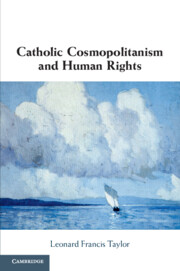
- Cited by 5
-
Cited byCrossref Citations
This Book has been cited by the following publications. This list is generated based on data provided by Crossref.
Taylor, Leonard 2020. Catholic Cosmopolitanism and the Future of Human Rights. Religions, Vol. 11, Issue. 11, p. 566.
Driessen, Michael Daniel 2021. Catholicism and European Politics: Introducing Contemporary Dynamics. Religions, Vol. 12, Issue. 4, p. 271.
O’Neill, Brett 2022. Reclaiming “Natural Partnership and Communication”. Journal of Religious Ethics, Vol. 50, Issue. 1, p. 103.
Forlenza, Rosario and Thomassen, Bjørn 2024. Christian democracy as political spirituality: transcendence as transformation—Italian politics, 1942–1953. Politics and Religion, Vol. 17, Issue. 2, p. 229.
Ujházi, Lóránd 2024. Szempontok a világi krisztushívők szerepvállalásához a béke előmozdításában. Hadtudomány, Vol. 33, Issue. 4, p. 104.
- Publisher:
- Cambridge University Press
- Online publication date:
- February 2020
- Print publication year:
- 2020
- Online ISBN:
- 9781108626446
- Subjects:
- Diplomatic and International History, Law, Human Rights, History


